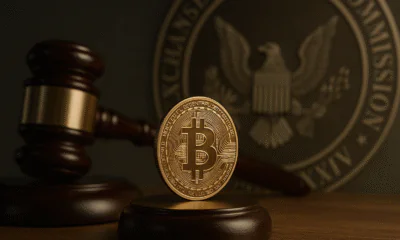Regulation
BitMEX and Poloniex Settle with Regulators Prompting Statement of Dissent from Commissioner Peirce – Regulation Weekly

The phrase of the past week is ‘enforcement action’. During this period we saw multiple regulators lay down heavy fines against fixtures within the digital asset industry, resulting in a statement of dissent from one of their own.
Poloniex Settles with SEC
Recently, the Securities and Exchange Commission (SEC) charged digital asset exchange, Poloniex, with offering securities through an unregistered platform. These charges have now been settled, with Poloniex having paid in excess of $10 million USD in fines.
This harsh fine, levied by the SEC, is founded on more than the fact that Poloniex offered illegal access to securities. In its investigation, the SEC found that behind closed doors, Poloniex repeatedly made the conscious decision to continue offering such assets in the name of profit, knowing the err of its ways.
Kristina Littman, Chief of the SEC states Enforcement Division’s Cyber Unit, states,
“Poloniex chose increased profits over compliance with the federal securities laws by including digital asset securities on its unregistered exchange…Poloniex attempted to circumvent the SEC’s regulatory regime, which applies to any marketplace for bringing together buyers and sellers of securities regardless of the applied technology.”
With these charges now behind it, perhaps Poloniex can move forward and recapture some of its popularity which has waned over time.
BitMEX Settles with CFTC
The SEC is not the only regulator keeping tabs on the digital assets sector. BitMEX has recently announced, in a move similar to Poloniex, that it has settled with the CFTC. Stemming from past lapses surrounding KYC/AML, this settlement sees BitMEX pay a hefty $100 million USD.
BitMEX CEO Alexander Höptner, addressed this development, highlighting its importance in allowing the exchange to move forward.
“Today marks an important day in our company’s history, and we are very glad to put this behind us. As crypto matures and enters a new era, we too have evolved in to the largest crypto derivatives platform with a fully verified user base. Comprehensive user verification, robust compliance, and anti-money laundering capabilities are not only hallmarks of our business – they are drivers of our long-term success.”
Interestingly, despite the rise of digital assets over the past few years, the CFTC and SEC still have not agreed upon which is responsible for their regulation. We recently highlighted this, as commentary from members of the CFTC, both past and present, brought the issue to light
Statement of Dissent
It has long been known that not everyone at the SEC agrees with its continued inclination towards ‘regulation through enforcement’. Roughly one year ago, Commissioner Hester Peirce delivered a speech which touched on a recent settlement at the time between the SEC and Telegram – a speech which highlighted her dissent surrounding the decision to do so. Fast forward to the present, and Commissioner Peirce has again voiced her opinion of dissent on the events involving Poloniex.
As previously mentioned, the settlement between the SEC stemmed from the failure of Poloniex to register as a national securities exchange or seek exemption. In this most recent statement, Commissioner Peirce notes that,
“There is just one minor problem – during the period at issue here (mid 2017 through 2019), the Commission was moving very cautiously with respect to regulated entities’ engagement with crypto assets. Sure, Poloniex could have tried to register as a securities exchange or, more likely, as a broker-dealer to operate an alternative trading system (ATS), a type of regulated trading venue that might be better able to accommodate non-traditional securities. Had it done se, it likely would have waited…and waited…and waited some more.”
She continues, “Given how slow we have been in determining how regulated entities can interact with crypto, market participants may understandably be surprised to see us to come onto the scene now with our enforcement guns blazing and argue that Poloniex was not registered or operating under an exemption as it should have been.”
Clearly sympathetic to the limbo in which digital asset exchanges have been placed, regarding regulations, Commissioner Peirce believes that moving forward a series of lingering questions/issues need to be addressed. In doing so, the SEC will be able to regulate not only through enforcement, but clear and thoughtful frameworks.












